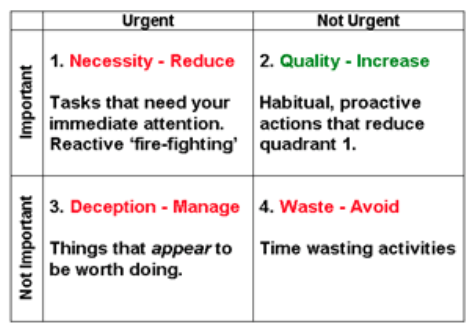Time management has been engrained in our brains since we were young. Even when we were in grade school, we had specific times every day when we completed certain tasks, whether it be reading time, math time, lunchtime, or even nap time.
Well now it’s a little different, but still essentially the same. Even though we may not have nap time every day (though I’m sure many people wished we did!), we still have certain tasks that need to be completed every day. That is why time management is so important. We only have so many hours in the workday, and we need to know how to best utilize it.
Call centers agents, in particular, need to have great time management skills. With so much going on at all times, it’s easy to get distracted and lose track of time. That’s why we have put together a post to help you make the most out of each day, and develop great time management habits.
Why time management in call centers is so important
So we’ve been told how important it is to manage things that are important wisely, from money to our personal relationships, but another sometimes forgotten about thing we need to manage is time.
Time is one of our most valuable non-renewable assets, and if you’re not careful, it can slip away from us. As famous writer Johann Wolfgang von Goethe once said, “Every second is of infinite value”.

There’s a law called Parkinson’s law, which essentially says “work expands so as to fill the time available for its completion”. Cyril Northcote Parkinson, who worked in the British Civil Service, saw how their government works and saw firsthand how people tackle tasks. If you give yourself 3 days to complete a task that actually should take 3 hours, the task will increase in complexity and fill all your time to complete it.
Understanding how long a task will take, and allocating the appropriate amount of time is the base to having good time management skills. Similar to that is the Pareto Principle or the 80/20 rule, which states that 80% of the outcome will come from 20% of our efforts. That can be tied into time management in many different ways, the main one being the importance of prioritizing our important tasks, as they can really make an impact on the business.
So why does all of this stuff really even matter? Some people probably think as long as they get their work done, everything is fine. However, good time management can have a ripple effect that extends way beyond simply getting your work done more efficiently.
1. Less stress
Getting your work done in a timely manner will inevitably lead to much less stress. Deadlines looming can really put a burden on people, which can lead to poorer quality work. Being less stressed can help you feel more in control, both of your time and your work.
There are many different reasons why time management can help to reduce stress. For one, you will have a much better work life balance if you manage your time properly. It’s important to create time for friends and family, as it recharges your mental energy.

2. Higher quality work
As we just stated, not having to rush around will lead to fewer mistakes and an overall higher quality of work. You will have time to review what you’ve done, or establish a better game plan for what’s next, or seek others to help review what you’ve done.
3. More opportunities
If you have good time management skills, and get quality work pushed out consistently and on time, you are likely to have more opportunities thrown your way. In the case of a call center, maybe they’ll make you a floor manager, or give you some bigger accounts to contact.
4. Less overall effort
Managing your tasks well will lead to you needing to pour less overall effort into these tasks. You can spread your effort out over an appropriate amount of time, rather than having to crunch it all into a very small period of time.
5. Develop self discipline
Having discipline is an incredibly difficult trait to master, but it’s one of the most valuable ones. Being able to manage your time in an effective manner is a great way to create habits, and in turn, develop self-discipline, not only at your job but in life in general.
There are many different ways to better develop self discipline. One of the most important is knowing your weaknesses. By being able to acknowledge your weaknesses, you can begin to overcome them, and become a better time manager.
Call center time management tips
So we have a better understanding of why time management is important, but how do we put this into action? Below, we will layout some steps you can take to be a better time manager, and an outstanding employee in your call center.
So let’s dive into some of the best tips to improve your time management skills!
1. Create a to-do list
Although this may seem a little silly and simple, writing down your goals for the day can go a long way when it comes to better time management. Being able to simply see what the day has in store means you have a good idea of which tasks will be more time consuming and cost you more mental energy.
Even if it’s just a few things, seeing what you have to accomplish makes it easier to do. This can also be used when you’re feeling overwhelmed. If you simply write down what you have to do, it usually doesn’t seem as daunting as before.

2. Complete the most important tasks first
Prioritizing your most important tasks and completing them early in the day is a great way to ensure you best utilize your time. Let’s face it, some tasks simply require more mental energy, and saving them for the end of the day can lead to lackluster work. By creating a to-do list, you can better visualize which tasks will likely be more difficult, and get those done first.
Working in a call center can be overwhelming at times, so getting complex tasks done early in the day can be a massive benefit.
3. Check off boxes on your to-do List
Believe it or not, checking things off your “to-do” list can be surprisingly useful. Feeling like you’re getting things accomplished can get the ball rolling, and help give you the energy to finish out your tasks.
A good way to begin checking off boxes on your to do list is by setting small and achievable goals. Trello uses use the acronym SMART to define these goals
- Specific
- Measurable
- Attainable
- Realistic
- Time bound
By creating and completing small tasks, our brain literally releases dopamine, which is the chemical that is connected with feelings of pleasure and motivation! With this release, it makes our brains eager to complete more work!
4. Say no sometimes
Saying no can be hard. But when you work in a contact center and have so much already going on, you simply have to sometimes. Saying yes to everything may feel like you’re being helpful, but in reality, you can easily be drowning in work and producing work that isn’t up to standard.
Saying no can be one of the hardest things for people to do, especially if they are a “yes person”. Growing up, you probably knew someone who was a “yes person”, and on the outside they may seem well put together, but chances are, they were stressed and overworked. As simple as it may be, saying no can save you a lot of headache in the long run.
5. Get a good night’s sleep
Remember when your parents used to make you go to bed early? Well, it turns out that’s actually a great idea. When you get a good night’s sleep, your brain can function much better than on a not so great night’s sleep.
It is typically suggested that you try to get 7-9 hours of sleep per night, if possible. Another tip, that can be related to sleep, is being sure to stay hydrated. Staying hydrated ensures every function of your body is operating efficiently.
6. Block off time to complete tasks
This is a little known trick that can greatly help with improving your time management skills. Simply blocking off time, whether on your calendar or mentally, can help you accomplish more. Going back to Parkinson’s law, if you give yourself an appropriate amount of time, you can get more done.
When working in a call center, you will probably get a good understanding on how long it takes to complete tasks, whether they be calls, emails, or something else. Block off a certain amount of hours and try to complete a certain amount of calls or emails in the allotted time.
7. Take a break from your screen
Generally speaking, screens can be bad for your eyes, and mind, when you stare at them for extended periods of time. It’s suggested that you take a break from your screen at least once an hour. This can be a good time to take a quick walk, if time allows, or going to get some water or a snack from the breakroom. Just stepping away briefly can rejuvenate your mind, and get you firing on all cylinders again.
Taking a break from your screen can also lead to improved quality of sleep, if you can make it a habit. One of the most common things people do when it comes to screen time is getting sucked into a trap, where they check their device for one thing and end up doing a bunch of unrelated things.
Another thing to note, if you are stepping away from your computer, don’t leave one screen to look at another. Checking your phone while moving away from your screen kind of defeats the purpose of taking a break from your screen. Some phones actually offer screen time reminders, to help you cut down on unintended browsing.
8. Don’t try to multitask
No matter how good of a multitasker you think you might be, chances are, you’re not as good as you think you are. By solely focusing on one task, you can better wrap your head around the task, and won’t get distracted by any other work you may be doing.
You will be much better off totally focusing on one thing, for a certain period of time, and then completely shifting to your next task. This is especially important if you are shifting to or from a task that requires a lot of creative thought or energy. In the case of a call center, maybe you have a big account you want to call, but need to make sure your pitch is spot on. You would want to focus entirely on that before trying to work on something else.
9. Don’t get hung up on small details
As hard as it might be, not everything needs to be absolutely perfect. It’s way too easy to get hung up on an otherwise very minor detail in a project you are working on. Focus on getting the task complete. More times than not, your first crack at something will be pretty good.
It can be easy to spend hours, or even days, on something extremely minor. You need to be able to see the bigger picture, and that chances are, people are not going to notice a small detail you might not be totally in love with. It’s better to get a product out and make adjustments as needed than comb through every detail to get it perfect the first time.
10. Telecommute
If it is possible for you to work remotely, you should consider telecommuting, even if it’s only once or twice a week. The average American commute can take upwards of 30 minutes – and that could be made worse by unexpected traffic. Telecommuting can save you hours each week that would be otherwise wasted.

11. Allow others to help you
You don’t have to do everything all on your own. If you have too much on your plate, ask others for a little help. As the saying goes, “teamwork makes the dream work”, so don’t feel like you are burdening someone when asking for a hand.
If someone reaches out because they see you struggling with something, don’t take offense to it! They want to see you and the company succeed, and accepting the help can be a great relief for your mental health and workload.
12. Learn to Delegate
Similar to allowing others to help you, if you are in a position to delegate certain tasks, do so. It’s one thing to ask for help on a certain task, it’s another to delegate that task permanently. It can be hard to trust others with tasks you normally handled yourself.
Employees like when you trust them, so sit down with them and figure out if there are things they want to take on. Create sets of instructions, or standard operating procedures (we will talk about this below), to help get them off and running.
13. Create a standard operating procedure
In many businesses, with call centers being no different, standard operating procedures are commonly used. Essentially, a standard operating procedure is exactly what it sounds like – a set of rules that are used in order to complete tasks in the most efficient way possible. These are usually written by employees, and are usually used by new employees to catch them up to speed.
An SOP can be greatly beneficial, especially if a task has lots of moving parts or is otherwise complicated. When writing a standard operating procedure, write it as if the person reading it has no idea how to do a certain job. It should be all encompassing, and cover any possible questions that may arise.
14. Read what others do
Just as you are doing now, reading about what others do to properly manage their time can help greatly! Everyone is different in how they manage their time, so maybe you just haven’t read the right tips yet!
Forums such as Reddit are often times great places to get new opinions on time management (or any subject really)! Users often are writing purely to help others, and can provide insights that you may have never thought of before.
15. Utilize a time tracking tool
A great way to visualize how your time is being spent is through time management software. Companies such as Time Doctor offer software that can help you track your time and activity, send you time use alerts, reminders when you get off track, and when to take a break. Having software that helps you manage your time can be of great help, especially to those that may not be the best at time management.
Similar to using a time tracking tool, you can use call monitoring software such as call recordings, call barge, and call whisper to help better coach your call center agents. You can review recordings with them, and see if there are ways they can improve their efficiency.
16. Create a time management matrix

Image credit: Time Management Success
A great way to visualize how to better use your time is through a time management matrix. A time management matrix basically divides your daily tasks up into 4 categories – important and urgent, important and not urgent, not important and urgent, and not important and not urgent.
Before we jump into what each quadrant means, it’s important to understand the difference between important and urgent tasks.
Important tasks contribute to the eventual achievement of your goals, where as urgent tasks require immediate attention, and usually tied to someone else’s goals. Not dealing with urgent tasks can typically lead to consequences for those involved if the matter is not resolved.
Here is a possible example of what a time management matrix might look like if you worked in a call center
- Important and urgent: Calling a high revenue account that has a major problem
- Important and not urgent: Long term projects / leads to call
- Not important and urgent: Last minute requests from coworker
- Not important and not urgent: Socializing with coworkers during work
Quadrant 1 are usually reactive tasks that need to be done right then and there, and putting them off could result in serious consequences.
Quadrant 2 is more proactive tasks, things that will help you in your personal and professional life. For example, it could be getting out ahead of your calls to leads or accounts, exercising, or meal prepping. This quadrant is meant to help reduce the time you have to spend in the other quadrants.
Quadrant 3 is known as “the quadrant of deception”. The tasks you do here thinking they are important and fall on your plate, but that may not always be the case. This is the quadrant where saying no can be helpful.
Quadrant 4 is essentially the time wasters in your life. Things such as surfing the web or watching TV fall into this. While this isn’t bad all the time, you want to be careful about how long you do these things, and make sure you really only do it on your own time at home.
The time management matrix is a great way to visualize how your time is spent, and where any time waste may be coming from. Having your employees sit down and create one of these can be a great way to get everyone on the same page when it comes to how time is spent and on what tasks.
Conclusion
Let’s face it, time management really can be a tough thing to truly master. Between everyday distractions, feeling overwhelmed, and not properly prioritizing your tasks, time can easily slip away from you. But the first step to solving a problem is recognizing that you have a problem.
It’s easy to not do anything about time management skills. Most people probably think that as long as they get their work done, everything is fine. While that may be true for some people, it won’t cut it in most cases. As you progress in your career, you will inevitably have more and more on your plate, and it’s important to be prepared with the skills and discipline to manage your time wisely.
Time management in call centers is particularly tough. Depending on the nature of your call center, things can get pretty hectic. However, if you follow some of these steps, you can master time management and reap the rewards. Generally speaking, it is good to instill good time management practices right from the beginning. It’s much easier to be proactive, rather than reactive.
About The Author:



